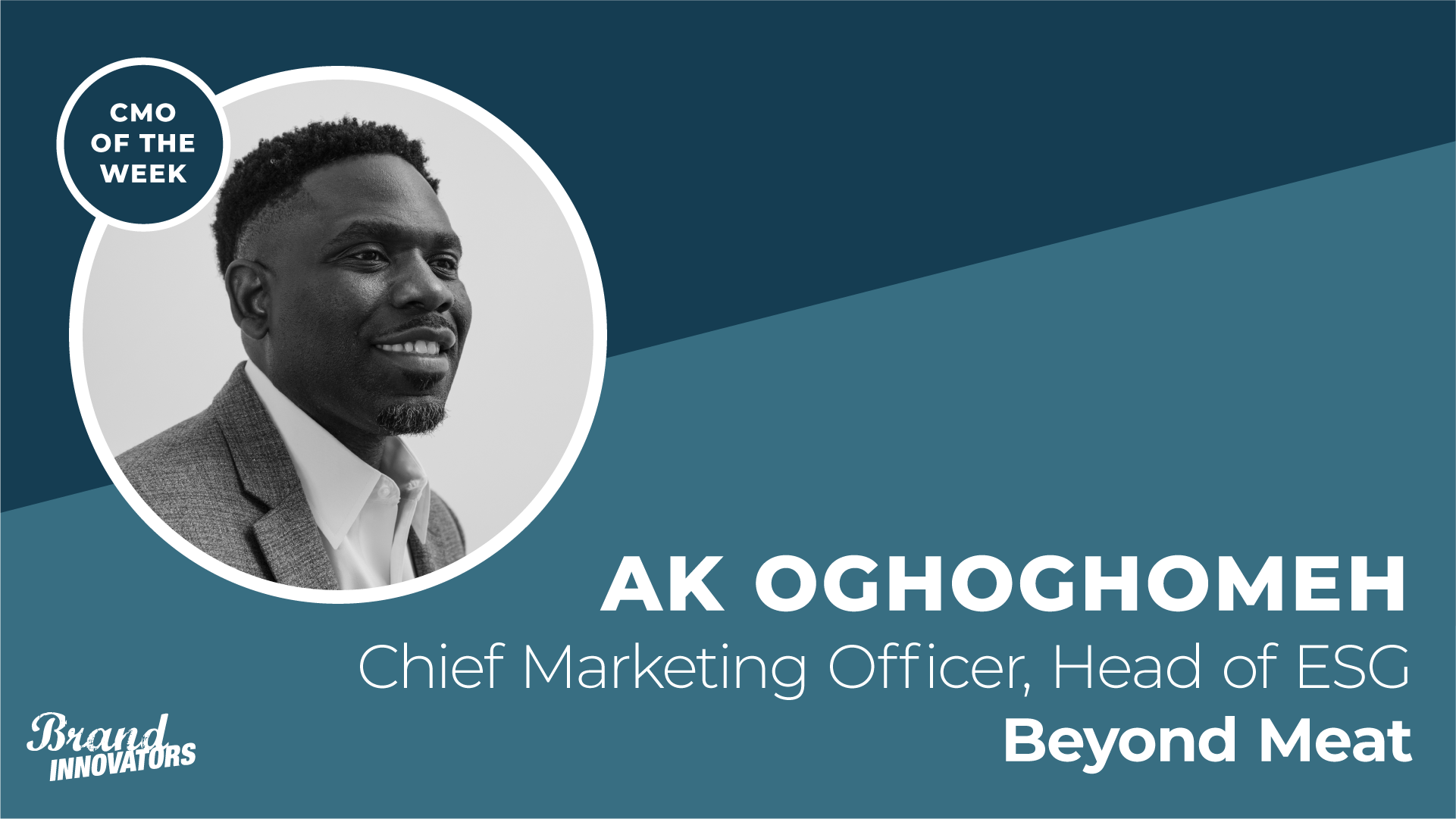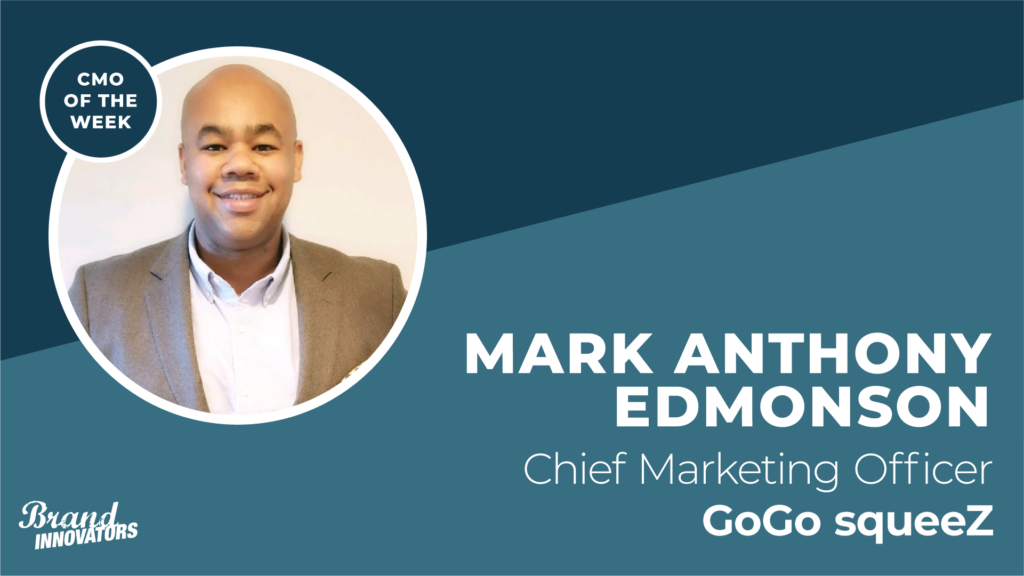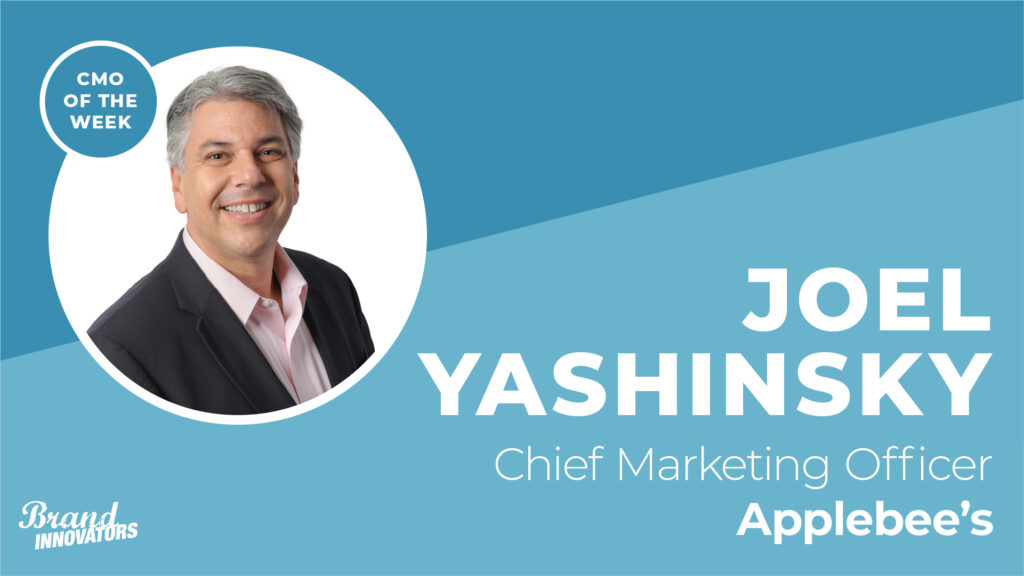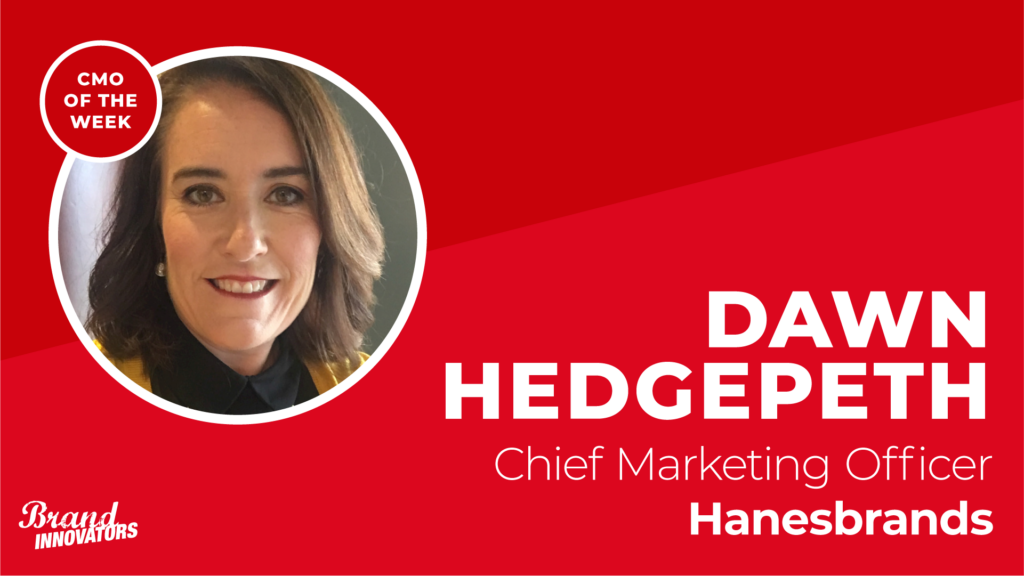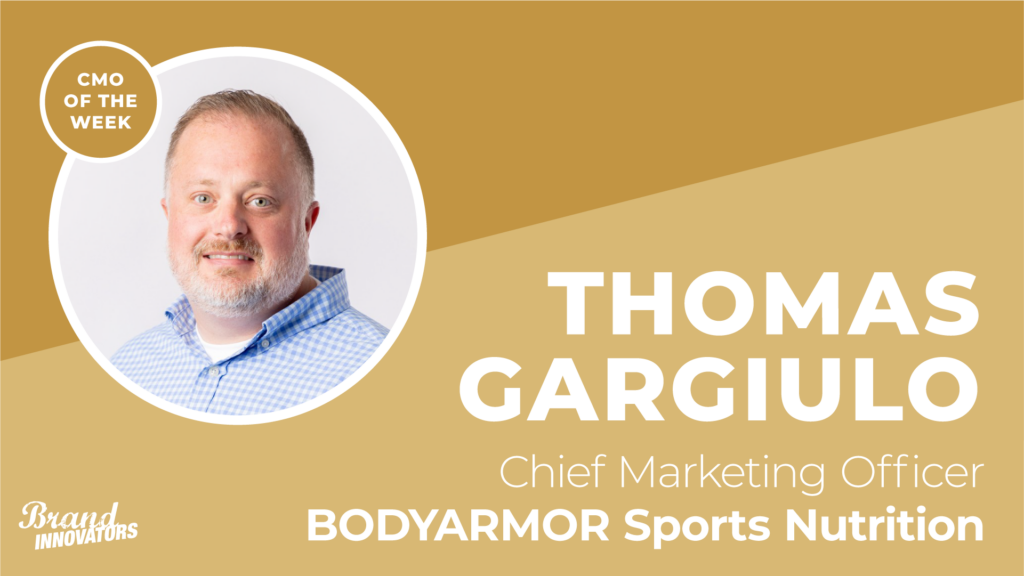Beyond Meat’s chief marketing officer AK Oghoghomeh has “the hardest job” he’s ever had in his entire career, but he is up to the task. The ex-Amazon, Red Bull and ConAgra exec has to convince people that eating less meat can help people live better lives, reduce greenhouse gas emissions, and improve the lives of animals.
“How do we convince people that changing their approach to food will have an outsized impact in all of these factors, in ways that they could have never believed,” explains Oghoghomeh. “It doesn’t mean that they have to sacrifice. They still get to eat all the foods that they love, but in a slightly different way.
Beyond Meat is a disruptive brand in a new category. Plant-based meat is still relatively new and the company is working to build out a strong go-to-market approach that disrupts an industry that’s been around for millennia.
“Very few people can say that,” says Oghoghomeh. “The automobile has been around since the early 1900s, while meat has been consumed by human beings for thousands upon thousands of years. However, the interesting thing about that is that we ate plants first. So this is really a reversion back into what got us here.”
Beyond Meat’s mission is to “redefine the future of protein with plant-based, sustainable alternatives.” In his new role, Oghoghomeh is excited about the impact he can have by driving this mission forward. “I know if I can do my job really well, we can have an outsized impact not just on the bottom line for this company but really for society at large on a global scale,” he said.
Brand Innovators caught up with AK Oghoghomeh from his office in Los Angeles to talk about brand building, innovation and working for founder-led companies. This interview has been edited for length and clarity.
How are you bringing Beyond Meat’s story to life?
Beyond Meat has a really robust social footprint. We leverage brand ambassadors and athlete influencers to help tell our story. Amplifying advocacy from trusted people and credible third party organizations is an important part of our go to market approach. My teams are working on the launch of the fourth generation of our Beyond Burger. The product has a new recipe that is aimed at addressing a top driver for heavy consumption of plant based meats. We’ve somehow found a way to improve the taste and texture of our product while also making it healthier. It’s got 60% less saturated fat than the previous iteration. It’s also now made with 100% avocado oil, so it’s creamier, and we removed the seed oils.
The opportunity that we have now is to amplify this incredible product. We worked with some of the leading nutritionists and dieticians in the country and some incredible organizations like American Heart Association, American Cancer Society, the American Diabetes Association. Stanford University and Oxford on the development of this product. So we’re working with them to help tell our story to the consumer. We will do this with story telling through social as our key lever. We are also using connected TV, out- of-home, and audio to help drive our messaging through paid media.
Can you talk about your approach to innovation?
We are trying to disrupt a multi-millennia old industry. Our general premise is that we create foods that allow you to eat what you love, which means that the products that we create have to be nearly indistinguishable from animal protein. This is really hard to do. And there are so many different types of animal products out there. The other challenge is making sure that the foods not only taste great but give a reason to the consumer to want to make the switch. That’s why we continue to focus on making our core proteins better than ever.
One of the things we’re really excited about right now is the work that’s happening in Europe.
We’ve been working with McDonald’s for the last several years. We created the McPlant Burger, which has been a big success in many European markets. We just launched the new McPlant Nuggets, that is an alternative to the original Chicken McNugget from McDonald’s. The product is incredible and has been a huge hit with consumers.
We know that in order for us to really cross the chasm into the new majority of consumers, we have to make our products cost a lot less than they currently do. The whole idea of brand marketing is to reduce the primacy of price on a product or service, by creating an emotional connection that a consumer has with a brand or product. Because of this it is somewhat counterintuitive to bring the price down on products that we make, however we know that price is a major driver. Our teams worked hard and have been able to achieve parity pricing with chicken for McDonald’s. That is a massive step forward in the world of plant-based. Now, my job as a brand marketer is to help consumers understand that the premium that they pay for our products is worth it, which will only be possible with a strong brand.
Who is your audience?
We are targeting flexitarians. These are people who eat animal protein the majority of the time, but eat plant-based for convenience and health reasons. But I don’t want to forget my core. Vegans and vegetarians make up roughly 3% of the total population, if you add in pescetarians, it’s about 6%. But they make up over 20% consumption of our product. When you have an over-index like that, you don’t disregard it.
We look at our meat-free consumers and say, hey, we are the brand for you. We’re a delicious product. We’re a healthy product. We can help you meet your macronutrient needs while we’re also still speaking to the broader consumer base, making sure that they know that we taste incredible, but we’re also good for you when you’re looking for an alternative to meat. Ultimately, more than 50% of our heavy consumers eat animal protein 80% of the time. So we’ve got to make sure that we’re speaking to both, because they’re both massive audiences and represent significant consumption.
How are you approaching Gen Z?
If you are looking for a consumer base that is so perfectly aligned with our brand, it is the broader Gen Z audience. This is an audience that actually understands the linkage between diet and climate change more so than any other generation. The protien that you have at the center of your plate, has a larger impact on the environment than the car that you drive. Gen Z is very aware of this as they’re focused on the future. They’re eating our products because they know that we’re great for the environment and many care about the welfare of animals. We know that that’s a major concern for this consumer group.
In order for us to grow in the future, we need to get more Gen Z to amplify their advocacy of our products to older generations. They are incredibly important. We really do our best to connect to them on social and through our influencers and ambassadors.
How has your background with brands including Red Bull, Amazon and Conagra, etc. helped shape your current perspective?
I wouldn’t be at a place where I could do this job well if I hadn’t been at Red Bull and Amazon and Campaign Monitor and Conagra, because all of those experiences helped shape my understanding of how to move the needle in my business today. There is no better place to be a brand marketer than Red Bull. Being the SVP of Brand Marketing for the US with significant people and monetary resources under my purview was incredibly helpful in the execution of my strategy. I understood how to leverage really big resources in really powerful ways, driving significant growth year over year.
At Amazon, I learned what it meant to be a leader. The adherence to the leadership principles that are ingrained within each and every person in that company was something that I was able to carry forward when I went back to Red Bull and then also here at Beyond. Red Bull, Amazon and Beyond Meat are all founder-led companies. Amazon is gargantuan but at the end of the day it was a founder led company under Jeff Bezos and his impact was felt every day in those halls. Red Bull was founded by Dietrich Mateschitz who led the company up until his death last year and the personality of the brand and the way in which we approached the market was a direct reflection of him.
Beyond Meat is led and created by Ethan Brown, a founder that’s got a really powerful mission.
What’s really unique about all of these experiences that I try to apply at Beyond Meat is finding ways to drive growth in a business and a category that should be growing much faster. The opportunity is for us to actually start extracting sales from the equity of the brand to make the business match the brand in terms of its size and growth.
How are you thinking about AI?
I recognize that AI will revolutionize the way that we do everything within business, whether it’s product development, marketing or hiring. The way that we think about planning our businesses and our operating expenses, the way that we map our P&Ls, it will really shape the way that we move forward in the future. As a CMO of a brand that is still growing with limited resources, I’m looking to leverage AI to really scale what it is that I can do in an efficient way. I am constantly asking myself “How do I scale my communication to consumers?” “How do I scale the development of creative, copy, and content to speak to these audiences and consumers in a credible and authentic way?”
Working with companies like Google, Microsoft and OpenAI is going to help us really find new ways to speak to the consumer in a credible way. The really interesting thing for me is the application to product development to start finding ways to innovate very quickly. It’s a tremendous proving ground for new product concepts that you’re looking at even new ways to market these concepts. It’s a really quick tool that we can use.
One of the things that is really daunting for many CMOs is that we look at AI as this thing that’s going to take everything over. And I agree, but at the end of the day, it’s still a tool. There’s still a human being behind that tool. Ultimately, in order for us to get the most out of that tool, we have to have the right people using it in the right ways. They’re the ones that are going to drive those outcomes that I spoke about earlier.
